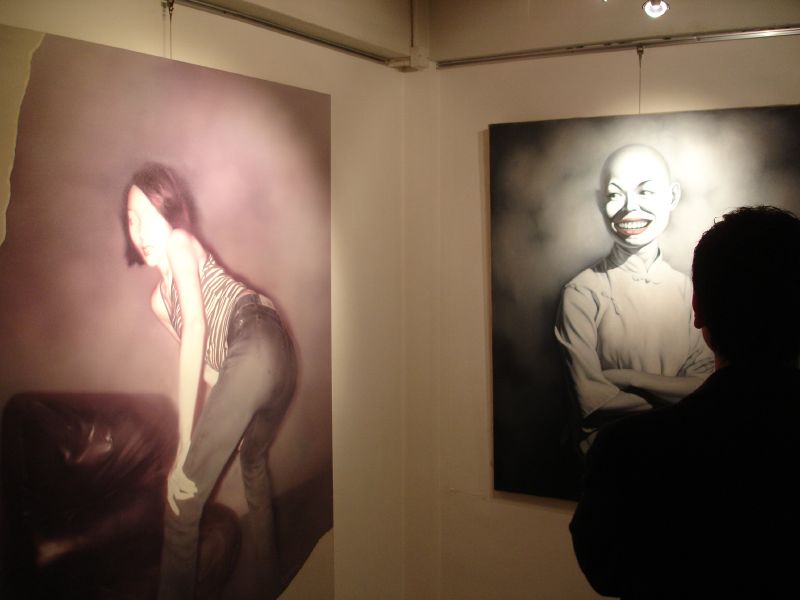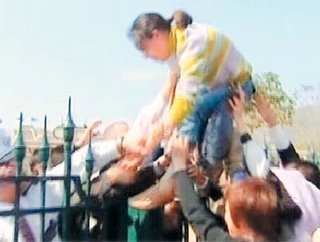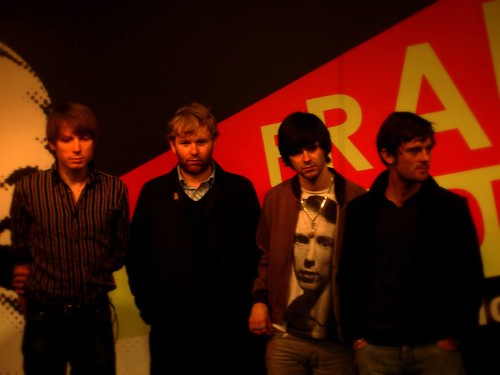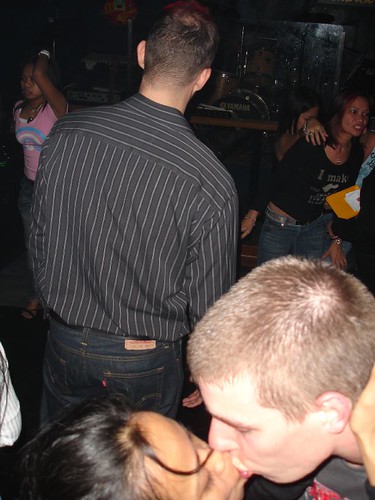Not long ago, I joined my mom on a bus tour of
After a few buzzers we entered what looked like an office that had been hastily set up, about 20 years ago. Drop ceilings, florescent lights, a plaque on the wall and a cheesy display case with a bonsai tree inside. A woman ferries us into the factory, where a dozen smart looking people are assembling knockoff jewelry. One booth where men are preparing the liquid metal for the castings, a floor of ten men polishing stones and assembling the jewelry, another booth where two technicians are working on the more delicate pieces. We look at a huge piece of jade attached to the wall. And then she takes us into the showroom. A clean, shiny, carpeted huge room, like the incongruous stores you end up in after a tour through the dark halls of the museum. Six of us, and behind about twenty display cases, a silent army of twenty salespeople, dressed in what I now remember as tuxedos. They were all staring at us, slight smiles. We were outnumbered. It was a hard sell David Lynch has probably imagined.
One woman tried to sell me the same ring my mother was looking at, even though I told her I don't really wear them. After she tried to sell me a silver dog pendant. Before she tried to sell me a bracelet, before I told her I actually don't wear any jewelry. Before she pointed at the wooden/lotus seed bracelet I got at a monastery in Ulan Ude and insisted upon a jade one to match. Before I hid in the corner.
Anyway, it didn't occur to me until later a) that probably every hapless city tour goes through a place like that and b) how apt a symbol of Hong Kong as anything a place like that, where we were, was. The small factory (factory should be in quotes) was merely the spectacular anteroom to the showroom, the magical attraction--like an alchemist's workshop--that not only justifies the subsequent shopping detour, but turns the shopping experience from a detour into a logical part of the tour. This isn’t a cheap ploy to insert some souvenir commercialism into a city tour, but a great opportunity to get up close and personal with the city itself, like a trip to the Peak, or to the Jumbo floating restaurant, or a ride on a sampan, or a stop at
This is apparently what
Another symbol, albeit exaggerated, of
(Beneath a good portion of the world's smog, you can just make out the People's Republic of China)
Anyway. That factory wasn’t really a factory. It was another part of the showroom.
Last Sunday, David and Yumi and Austin and Hanna and I rode the commuter KCR train for an hour to Lo Wu and made our way over there, to the city of
Like the DVDs, nothing there seemed real. The mirror-covered mall sitting adjacent to the train station reminded me of a space ship-I thought of the now doomed Kurfurstendamm in
J’s driver picked us up in a van from the hotel in Shenzhen. There was a yellow Lamborghini parked outside. We drove fifty minutes on highways that were still under construction. A patchwork of fields and hills and anonymous towns and apartment complexes raced past the windows. For a moment it was as if we were driving along some proto-strip mall and freeway town in an isolated part of New Jersey that had just been discovered and was rapidly being brought up to speed with the rest of the suburban state; China seemed, in this early impression, to tell an alternate, faster story of development, American economic growth on speed. (For a sense of the pace at which development moves in
If today is typical, builders will lay 137,000 square metres of new floor space for residential blocks, shopping centres and factories. The economy will grow by 99 million yuan (£7m). There will be 568 deaths, 813 births and the arrival of 1,370 people from the countryside...
It’s worth noting that this is also at the head of the vast new 600km long lake created by the Three Gorges Dam project; the refugees from the flooded land have helped swell the city's population. For an idea of development and that dam, check out Edward Burtynsky’s photos; thanks ross)
Soon we were patrolling dusty sidestreets until we stopped in front of an unassuming white tile four-story house. The driver tapped something on the keypad and we were soon inside the dining room watching a Korean soap opera on satellite.
The first sign that J’s job was serious came when we walked past the guards at the entrance to the factory. Three men in uniform saluted him. He nodded, he had gotten used to this.
Once on a field trip in elementary school, I was inside a potato chip factory in
All told there were 4,000 workers in four factory buildings. Another factory was being built next door. Aside from the enormous rooms with people working robotically, sometimes in front of open flames, for eight hours straight (the white board in J’s office evidenced attempts to adjust the shifts so as to fit two into a day while staying within legal limits), I was surprised by the sheer amount of jewelry they were making. It was all cheap copies—costume jewelry—made of glass and metal with a special coating to make it look real, and probably will sell for 15 times its cost of production ($1) at stores in Asia,
We ate lunch at his townhouse, a great Korean spread prepared by his cook, who once worked in a Korean restaurant. We talked about surfing, about the market for surfboards, which J is planning on manufacturing (secret!). Then we played some Korean billiards upstairs in the “game room” on the roof. The angles are so important, in Korean billiards. There are no pockets. We talked about relationships. A person watched us from the adjacent roof. Smoke in the background. Yes it was surreal.
We piled in the van and headed into town to get some DVDs. This is one of J’s favorite pastimes. Fortunately, his driver speaks Mandarin, which is useful if you want to get past the standard selection out front and dive into the real stashes, hidden from the sight of inspectors who’ve been making raids in recent years, holding bonfire parties in the streets in the name of the MPAA. A trip to another store, and upstairs into a large crawl space, a secret room that almost defied the laws of architecture, behind a fake bookshelf, revealed an embarrassment of movies. Imagine raiding Quentin Tarantino’s tomb. In the dust light, in the middle of the piles of shiny boxes was the shiniest, the jewel in the crown that I had been searching low and low for, that had escaped me online, in Chinatowns, even at Moscow's DVD mecca, the electronics market at Gorbushka: The Complete X-files. Imagine: the cancer man episode, the freaks episode, the one written by William Gibson about a killer artificial intelligence that lives inside a trailer, the alien rock, the episode that takes place in the 80s when Mulder carries around that enormous cell phone, etc. I make no apologies for this.
But I couldn’t do it. It wasn't guilt. For all I knew 20th century fox had changed their name to 20th century, as the box indicated, and had begun to sell the entire series on DVD for 10 USD (Though Chinese bootlegs are packaged quite convincingly, occasionally you'll come across the description for a completely different movie, or film reviewer quotes apparently chosen by a non-English speaker, like the unfortunate "Flawed!" I spotted on the side of a Bruce Willis movie.) No, the box was just too big. I opted instead for a handful of recent classics like Crash (pretty, pretty didactic) and Jia Zhangke’s The World and Good Night and Good Luck and Walk the Line (I haven’t seen them yet). We left giddily with about 30 discs total for about 30 dollars.
I stepped outside as J’s driver was haggling with the guys behind the counter and for the first time glimpsed a bustling Chinese town that showed almost no sign of foreign influence, no sign in English. I looked into cell phone stores, and into tea shops with women standing outside in uniform waiting for their afternoon customers, and watched an endless chain of men ride past carrying large bags on the backs of their bicycles, or other men. Of course there was a touch of the foreign beneath. I got the sense that in some way, all of this had been underwritten by large companies with home offices in








